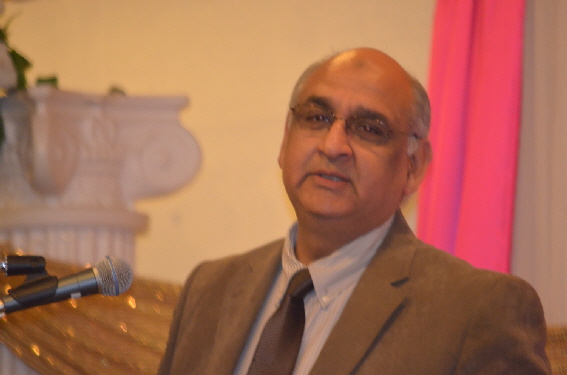|
"Tera Ehsaan Ghazal Hai"
By Dr Amjad Parvez
Dedicated to his father, Professor Salah-ud-Din Wasti, Sabahat Asim Wasti's third poetry book Tera Ehsaan Ghazal Hai has recently been published. Sabahat is a doctor by profession and a poet by passion. He resides in the UK. His father's immense love of poetry presented him with a golden opportunity to read the works of poets like Muhsin Ehsan, Ahmad Faraz, Farigh Bukhari, Raza Hamdani, Faiz Ahmad Faiz, Hafeez Jalandhri, Abdul Hameed Adam, Ehsan Danish, Ibn-e-Insha, Ahmad Nadeem Qasmi, Parveen Shakir and the great artist Sadeqain.
In the introduction to this book, Sabahat says that time is a merciless reality. It goes by in such a way that a person of your past can change to the extent that you may no longer be able to recognise them in the future, without them realising that they have evolved into an entirely different person. Thus, each passing moment leaves its mark on all the lives it touches. Finally, he admits that the development within his inner self must have taken centuries to evolve; he was unaware of it. However, once he has resolved this mystery and extinguished the fire burning within him, he then felt yet another spark come to life; he felt that he was somehow incomplete. Sabahat, in this frame of mind, says, "Sadiyon say ho raha hai mera irtiqa magar/Apni nazar mein ab bhi mukamal nahin hoon mein" (Though I have been evolving for centuries/I still do not feel whole).
With the passage of time, Sabahat matured and so did his questions; he then wanted to figure out the realities of the world and the universe. The first line he wrote in his youth was: "Tere hi hukm sey ya Rab sanwarti hain ye taqdeerien" (It is because of You, O God that destinies are amended). The book under review concentrates more on the poet's inner contemplations rather than the external factors that aggrieve him. However, the readers get a very optimistic view when he writes: "Hai abhi waqt humein chahiye tauba kar lain/Is sey pehley keh woh darwaza muqfil ho jaaye." (There is still time to seek God's forgiveness/Before the door closes forever).
Although Sabahat has a diverse talent in writing all kinds of poetry, his work really comes out and shines in the ghazal format. In the naat format, he wrote a couplet that said "Daleel is say bari hai azmat-e-guftaar ki koi?/Kabhi jaate na dekha lafz koi raigaan un ka" (Is there a better argument in the favour of his sayings that none of his words has ever gone to waste?). It validates Sabahat's belief in the authenticity of each word of the Prophet (PBUH). One of his finest writings includes, "Zinda hoon ik lamha-e-maujood kei liye/Is pal ke baad koi pal nahin hoon mein" (I am alive for this present moment/For me there no moment except the present moment). What he has expressed here is one of the most beautiful and mesmerising feelings in the world. He has freed himself of all his worries and commitments; he has done what most of us only wish to do. He is living only in the present moment. All he wants to do is live for this one moment alone.
At another point in the book, he admits that he was not right in all the decisions he took, in all the things he said, and all the plans he executed. However, the journey taught him a lot: "Tum bhatak jao to zauq-e-safar aa jaye ga/Mukhtalif raston pe chalney ka hunar aa jaye ga" (Once get lost, you shall learn the thrill of the journey/In the process, you shall learn to tread successfully on different paths). However, every passing moment still contributed to his inner development, taking him closer to the answers to all his questions till he reached the point where he found salvation in the life hereafter. It was then that he realised that this was the answer he was searching for all along. Sabahat winds up this belief in the couplet: "Guzar chuka hai jo lamha woh irtiqa mein hai/Meri baqaa ka sabab to meri fanaa mein hai" (The moment that has passed is still somewhere in the process of development/My salvation, however, is in my termination). Sabahat's conviction in God for his betterment is again reflected in his couplet: "Teri marzi mere jis naqsh ko jaisa kar dey/Ay musawir meri tasveer tere haath mein hai" (You can change me in any way You wish because/O! Almighty painter my portrait is in Your hands).
Sabahat's poetry is for mature readers who can appreciate the content of serious poetry. He may not be a philosopher but his contemplations do entice him to go beyond his own limits, to think 'outside the box'. Sabahat has knitted his thoughts together in simple vocabulary and an easily comprehensible language, but his thoughts are very wise and mature.
[Courtesy Daily Times, Lahore - October 1, 2010]
|